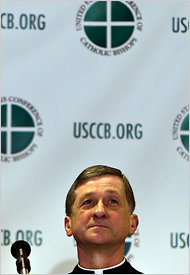By Laurie Goodstein
New York Times
June 14, 2011
http://www.nytimes.com/2011/06/15/us/15bishops.html?_r=2
[Full Text of Revised Draft Abuse Policy of the U.S. Bishops]
Despite recent cases in which Roman Catholic bishops failed to report or suspend priests accused of child sexual abuse, the bishops head into a meeting in Seattle on Wednesday proposing no significant revisions to the abuse prevention policies they passed in 2002 at the height of the scandal.
 |
| Bishop Blase J. Cupich of Spokane said the decisions of 2002 had “iconic status.” |
The bishops had promised that they would take a hard look at their policies in light of new accusations in Philadelphia and Kansas City, Mo., that have shaken many Catholics, not just in those dioceses, but across the country as well. The incidents have led some Catholics to question whether bishops are complying with their own policies, and whether there is any accountability for bishops who do not.
In the diocese of Kansas City-St. Joseph, Bishop Robert W. Finn admitted last month that he allowed a priest who had taken pornographic pictures of parish girls to continue celebrating Mass and having access to children.
Bishop Finn also acknowledged he did not read a letter sent to his office a year earlier by a Catholic school principal warning that parents, teachers and staff members suspected that the priest, the Rev. Shawn Ratigan, was a child molester. Father Ratigan was arrested on May 19 on child pornography charges.
“There’s no accountability and there’s no transparent protocol,” said Pat O’Neill, the co-owner of a public relations and marketing firm in Kansas City, who once served as a consultant for the diocese there. “I have never seen the anger as deep and widespread as I have seen and heard and felt it these last three weeks. It’s coming from people that I know of as very conservative, very devout, especially younger people.”
In Philadelphia, a grand jury recently found that Cardinal Justin Rigali allowed 37 priests accused of abuse or inappropriate behavior to remain in ministry. The grand jury also indicted the former head of the archdiocesan office for clergy, Msgr. William Lynn, on charges of endangering the welfare of children — the first such indictment of a senior church official.
In both of these dioceses, the bishops never informed their sexual abuse “review boards” about the cases. In his two years in the diocese of Gallup, N.M., Bishop James S. Wall never met with his review board even though the diocese was supposedly conducting a review of abuse cases, a situation first reported by the Gallup Independent newspaper.
The review boards, composed primarily of lay people with expertise in the field of child abuse, were supposed to be among the most significant measures the bishops adopted in 2002, known as the Charter for the Protection of Children and Young People.
The chairman of the bishops’ committee for child protection, Bishop Blase J. Cupich of Spokane, Wash., said in an interview: “It’s not the charter that’s the problem. It seems to me to be whether or not the people are using the charter as a reference point appropriately.”
There are few revisions because, Bishop Cupich said: “We consider the charter to have an iconic status. We believe the decisions we made in 2002 were significant. They involved not only a change in practice and policy, but I think culture as well, and so we are going to be reluctant to back off this commitment in any way to make any changes.”
The only significant revisions proposed in the charter are required because of new norms the Vatican issued last year. Those norms made abuse of a mentally ill person, and the acquisition, possession or distribution of child pornography to be crimes under the church’s canon law.
At their meeting, the bishops will also vote on their first formal statement denouncing assisted suicide and hear a report on a new church structure for Anglican parishes that want to join the Roman Catholic Church.
The question of what to do about bishops who do not follow the charter is not addressed in the revisions. The charter says only that bishops should apply “fraternal correction” to one another.
The bishops’ hands are tied, said Russell Shaw, the author of “Nothing to Hide: Secrecy, Communication, and Communion in the Catholic Church” (Ignatius Press, 2008).
“A body of bishops as such has no real authority or power to punish or coerce or chastise individual members who don’t go along with the majority, even when it’s an overwhelming majority,” said Mr. Shaw, a former communications director for the bishops. “That’s a question largely in the hands of the Holy See at the present time, and probably can only be addressed in a comprehensive and permanent way by alterations in canon law itself.”
Nicholas Cafardi, the author of “Before Dallas: The U.S. Bishops’ Response to Clergy Sexual Abuse of Children” (Paulist Press, 2008), said, “Fraternal correction has always been the elephant in the room.”
“Unless the bishops are willing to call each other out,” said Mr. Cafardi, the former dean of the Duquesne Law School, “we will always have individual bishops who think that they can ignore the requirements of the charter.”
Any original material on these pages is copyright © BishopAccountability.org 2004. Reproduce freely with attribution.